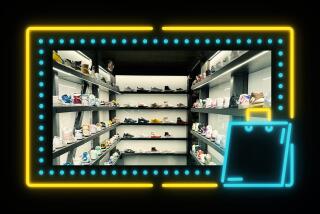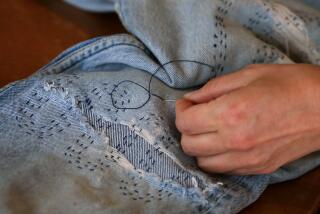Poketo wallets make art pay off
Angie Myung’s and Ted Vadakan’s dreams of having careers in the arts hit them right in the wallet. In a good way.
The Los Angeles couple own Poketo, a company they started in 2004to put emerging artists’ designs on inexpensive wallets. They call it an “affordable art” company, and there’s money in that, even for the small operation they run out of a downtown loft with just one full-time and three part-time employees.
Poketo had more than $500,000 in sales last year, Vadakan said. The company, which does about 70% of its business in wholesale, sold about 30,000 items.
“We sort of started the business by mistake,” Vadakan said. “We never dreamed of being entrepreneurs.”
For the artists and designers they commission, it’s a chance to get their work seen by a much bigger audience than might catch a gallery show or a university showcase. Santa Monica artist Leah Chun, who designed three wallets, two T-shirts and a mug for the company, got steady work as a website designer and animator through the popularity of her Poketo designs.
“Artists just starting out are begging for these type of opportunities,” Chun said. “We need to get our names out there and build up professional work, and they give us a shot.”
Starting off
Myung and Vadakan know what it’s like to try to get creative work before the public. In 2003 Myung was a student at the California College of the Arts in San Francisco and Vadakan was a budding filmmaker.
“Back then, when we could afford it, we’d throw a party to show off our friends’ artwork,” Vadakan said. “We wanted to have people leave the show with some art, but art is expensive and that wasn’t really happening.”
They came up with the idea of making wallets out of laminated paper printed with designs by their artist friends. To promote the products, they hosted a two-day gallery show, kicked off by a party. By the time the show was over, the wallets had sold out.
“We didn’t make any money, really, on the first wallets, but that wasn’t what it was about,” Myung said. “We just wanted to get our friends’ artwork into people’s hands.”
But given the way the wallets had flown off the shelves, the couple realized they might have the makings of a business.
In 2004 they relocated to L.A., moving in with Vadakan’s parents to save money.
The name of their company is a nod to Myung’s Korean grandmother’s mispronunciation of the word “pocket” as “poh-keh’-toe.”
To kick off the venture, they took the route that had worked for them up north.
“We decided we’d throw another party,” Myung said, “and make new wallets with new artists.”
All the wallets, from the beginning, had a note tucked inside with information about the artist who did the design.
Going all in
The couple added T-shirts to the lineup and sold the products on a website Myung designed. Within the first year, they were turning a profit, and boxes of merchandise were flooding Vadakan’s parents’ home.
“My dad had to tiptoe sideways to scoot through the living room because our boxes of wallets and T-shirts were everywhere,” Vadakan said.
With trepidation, they committed fully to making Poketo their livelihood.
“When Ted first told me he thought we could make a living selling the wallets, I told him we needed to get real jobs,” Myung said. “I still can’t believe this has all worked out.”
Moving on up
In 2005 they bought a house in Echo Park and moved the business there.
Together, they spent almost all their waking hours taking and filling orders, meeting with artists and trying to persuade stores to sell their products, at first on consignment.
Sales got a boost that same year when bands such as Weezer and Postal Service started to sell Poketo wallets at concerts. These wallets worked the bands’ names into the designs.
Dan Field, Weezer’s manager, said he spotted the company on the Internet, where Poketo has a Facebook page and a blog.
“We didn’t want to do the same crummy Velcro wallets every other band sells at their shows,” Field said.
And because Myung and Vadakan have arts backgrounds, he felt they were more in sync with the band than other merchandisers. “In a weird way they feel like a band and not a brand,” he said, “because what they sell is the art itself, not just a logo or something like that.”
Field is having Poketo design wallets for another act he manages: actor Jason Schwartzman’s band Coconut Records.
In 2007, Myung and Vadakan moved Poketo out of their home and into a loft where they also hosted art shows.
Poketo products are sold at art galleries and pop culture shops such as Giant Robot, as well as online. The business has gone international, with stores carrying the goods in Europe and Asia. On its website, wallets sell for $20 each.
Reaching out
Like artist prints, Poketo products are made in limited runs -- usually about 300 items, although runs of some products, including the band-themed wallets, can be much larger.
Once a wallet or a tote bag sells out, that’s it, Vadakan said. “If something sells well, then we’ll usually work with that artist to design something else. We don’t want to ever just make the same thing over and over, we want to keep the art fresh and unique.”
For their designs, artists are paid flat fees that vary greatly depending on the size of the run and the renown of the artist, Vadakan said.
Though Myung and Vadakan once dreamed of being professional artists, neither has done any designs for Poketo products.
“The business has meant a personal art career trade-off, but it’s completely worth it because Poketo has given us a platform to support the art community that we didn’t have when we were artists,” Vadakan said.
It has also given them a chance to make a living from art -- a status that vast numbers of artists never achieve.
“We love art, which is why we became artists ourselves, but now we really see ourselves more as art directors,” Myung said. “It’s almost the same thing as when we were throwing parties just to help our friends get their names out. It’s just bigger now, and we can reach more people.
“The excitement we had back then is the same thing we feel today.”
nathan.olivarezgiles
@latimes.com
More to Read
The biggest entertainment stories
Get our big stories about Hollywood, film, television, music, arts, culture and more right in your inbox as soon as they publish.
You may occasionally receive promotional content from the Los Angeles Times.










